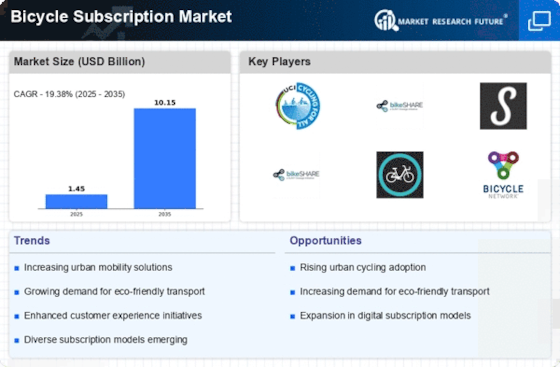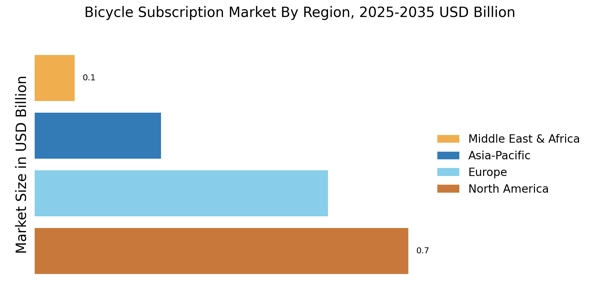Cost-Effectiveness
Cost considerations play a crucial role in the decision-making process for consumers, thereby influencing the Bicycle Subscription Market. Subscription models often provide a more affordable alternative to purchasing a bicycle outright, particularly for individuals who may not ride frequently enough to justify the expense. The average cost of bicycle ownership, including maintenance and storage, can be substantial. In contrast, subscription services typically include maintenance and insurance, making them an attractive option for budget-conscious consumers. Market data indicates that subscription services can reduce overall transportation costs by up to 30% compared to traditional ownership. This financial incentive is likely to drive growth in the Bicycle Subscription Market as more consumers recognize the value of cost-effective transportation solutions.
Rising Urbanization
The trend of increasing urbanization appears to be a significant driver for the Bicycle Subscription Market. As more individuals migrate to urban areas, the demand for efficient and sustainable transportation options rises. Urban centers often face congestion and pollution, prompting city dwellers to seek alternatives to traditional vehicles. Bicycle subscriptions offer a practical solution, allowing users to access bicycles without the burden of ownership. According to recent data, urban areas have seen a 20% increase in bicycle usage over the past five years, indicating a shift towards more sustainable commuting methods. This trend suggests that the Bicycle Subscription Market is likely to expand as urban populations continue to grow and prioritize eco-friendly transportation solutions.
Environmental Awareness
Growing environmental consciousness among consumers is increasingly influencing the Bicycle Subscription Market. As awareness of climate change and pollution rises, individuals are seeking sustainable transportation options that minimize their carbon footprint. Bicycles are recognized as a low-impact mode of transport, and subscription services facilitate access to these eco-friendly alternatives. Recent surveys indicate that over 60% of consumers are willing to consider sustainable transportation options, with many citing environmental concerns as a primary motivator. This shift in consumer behavior suggests that the Bicycle Subscription Market may experience significant growth as more individuals prioritize sustainability in their transportation choices.
Health and Fitness Trends
The increasing focus on health and fitness is emerging as a key driver for the Bicycle Subscription Market. As more individuals prioritize physical well-being, cycling is recognized as an effective form of exercise that promotes cardiovascular health and overall fitness. Subscription services provide an accessible way for people to incorporate cycling into their daily routines without the commitment of ownership. Recent studies show that regular cycling can reduce the risk of chronic diseases, which resonates with health-conscious consumers. This trend suggests that the Bicycle Subscription Market may continue to grow as more individuals seek convenient and enjoyable ways to maintain an active lifestyle.
Technological Advancements
The integration of technology into the Bicycle Subscription Market is transforming how consumers interact with bicycle services. Innovations such as mobile applications for easy access, GPS tracking for security, and smart locks for convenience are enhancing the user experience. These technological advancements not only streamline the rental process but also provide users with valuable data regarding their riding habits. Market Research Future indicates that companies utilizing advanced technology have seen a 25% increase in user engagement. As technology continues to evolve, it is likely that the Bicycle Subscription Market will attract a broader audience, particularly tech-savvy consumers looking for modern solutions to their transportation needs.


















